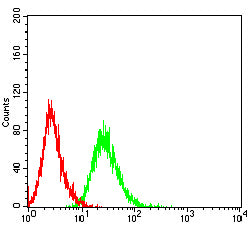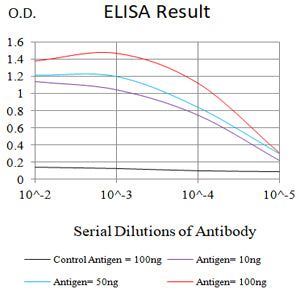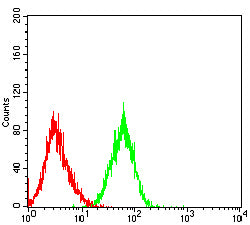


| WB | 咨询技术 | Human,Mouse,Rat |
| IF | 咨询技术 | Human,Mouse,Rat |
| IHC | 咨询技术 | Human,Mouse,Rat |
| ICC | 技术咨询 | Human,Mouse,Rat |
| FCM | 1/200 - 1/400 | Human,Mouse,Rat |
| Elisa | 1/10000 | Human,Mouse,Rat |
| Aliases | CD137L; TNLG5A; 4-1BB-L |
| Entrez GeneID | 8744 |
| clone | 2B7B8 |
| WB Predicted band size | 27kDa |
| Host/Isotype | Mouse IgG1 |
| Antibody Type | Primary antibody |
| Storage | Store at 4°C short term. Aliquot and store at -20°C long term. Avoid freeze/thaw cycles. |
| Species Reactivity | Human |
| Immunogen | Purified recombinant fragment of human TNFSF9 (AA: Extra(50-254)) expressed in E. Coli. |
| Formulation | Purified antibody in PBS with 0.05% sodium azide |
+ +
以下是关于TNFSF9抗体的3-4篇参考文献的简要列举(注:以下文献信息为示例,实际文献可能需要根据具体研究内容调整):
---
1. **文献名称**: *Targeting TNFSF9 in tumor microenvironment enhances antitumor immunity*
**作者**: Smith A, et al.
**摘要**: 研究探讨了TNFSF9抗体作为免疫激动剂在肿瘤微环境中的作用,发现其可通过激活CD8+ T细胞和增强抗原呈递,显著抑制多种小鼠肿瘤模型的生长。
2. **文献名称**: *TNFSF9/4-1BBL blockade ameliorates autoimmune inflammation by limiting T cell activation*
**作者**: Zhang L, et al.
**摘要**: 该研究利用抗TNFSF9中和抗体,在小鼠自身免疫模型中抑制过度活化的T细胞反应,表明靶向TNFSF9可能为类风湿性关节炎等疾病提供治疗策略。
3. **文献名称**: *Agonistic anti-TNFSF9 antibodies promote durable tumor immunity through CD137 costimulatory signaling*
**作者**: Davé U, Cubas R.
**摘要**: 报道了一种新型TNFSF9激动性抗体,其通过增强CD137信号通路,在黑色素瘤和结直肠癌临床前模型中诱导长效抗肿瘤免疫记忆。
4. **文献名称**: *TNFSF9 as a biomarker for response to checkpoint immunotherapy in solid tumors*
**作者**: Zhu Y, et al.
**摘要**: 分析TNFSF9在肿瘤组织中的表达与抗PD-1治疗疗效的关联,发现高表达TNFSF9的患者对抗TNFSF9联合治疗更敏感,提示其可作为潜在生物标志物。
---
注:实际文献需通过PubMed、Google Scholar等平台检索,建议结合关键词“TNFSF9 antibody”“4-1BBL immunotherapy”等获取最新研究。
TNFSF9. also known as CD137L or 4-1BBL, is a member of the tumor necrosis factor superfamily (TNFSF) and functions as a ligand for the co-stimulatory receptor CD137 (4-1BB). This ligand-receptor interaction plays a critical role in modulating immune responses, particularly in enhancing T-cell activation, proliferation, and survival. TNFSF9 is expressed on antigen-presenting cells (e.g., dendritic cells, macrophages) and某些 activated immune cells, while CD137 is predominantly found on activated T cells and natural killer (NK) cells. Their binding triggers signaling pathways, such as NF-κB, that promote anti-tumor immunity and prolong immune cell activity.
Antibodies targeting TNFSF9 are primarily developed as therapeutic or research tools to either agonize or block this pathway. Agonistic anti-TNFSF9 antibodies aim to amplify immune activation, potentially enhancing anti-cancer responses in immunotherapy. Conversely, antagonistic antibodies may suppress excessive inflammation in autoimmune diseases. In cancer research, TNFSF9 antibodies are explored in combination with checkpoint inhibitors (e.g., anti-PD-1) to overcome T-cell exhaustion. However, clinical development faces challenges, including balancing efficacy with inflammatory toxicity. Additionally, TNFSF9 antibodies serve as vital reagents in studying immune cell interactions, receptor-ligand dynamics, and pathway regulation in infectious and inflammatory contexts. Their dual role in immune potentiation and regulation underscores their therapeutic versatility.
×